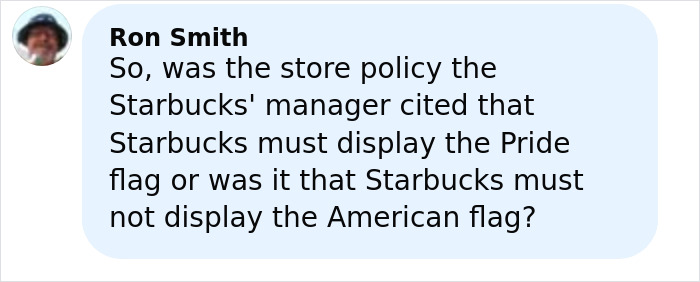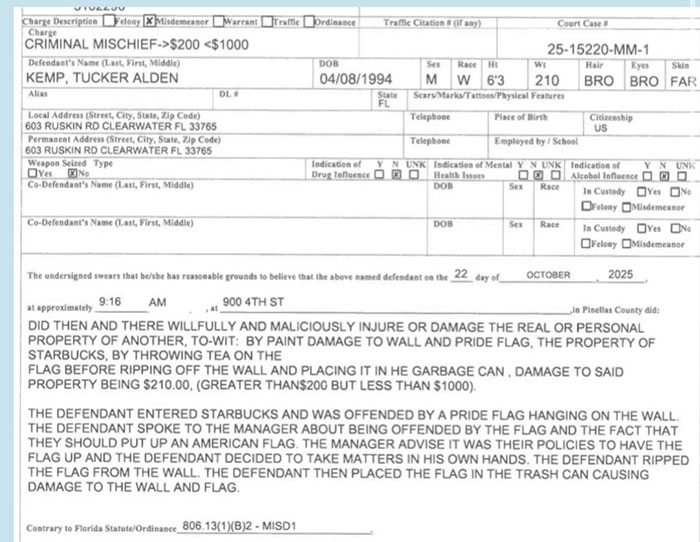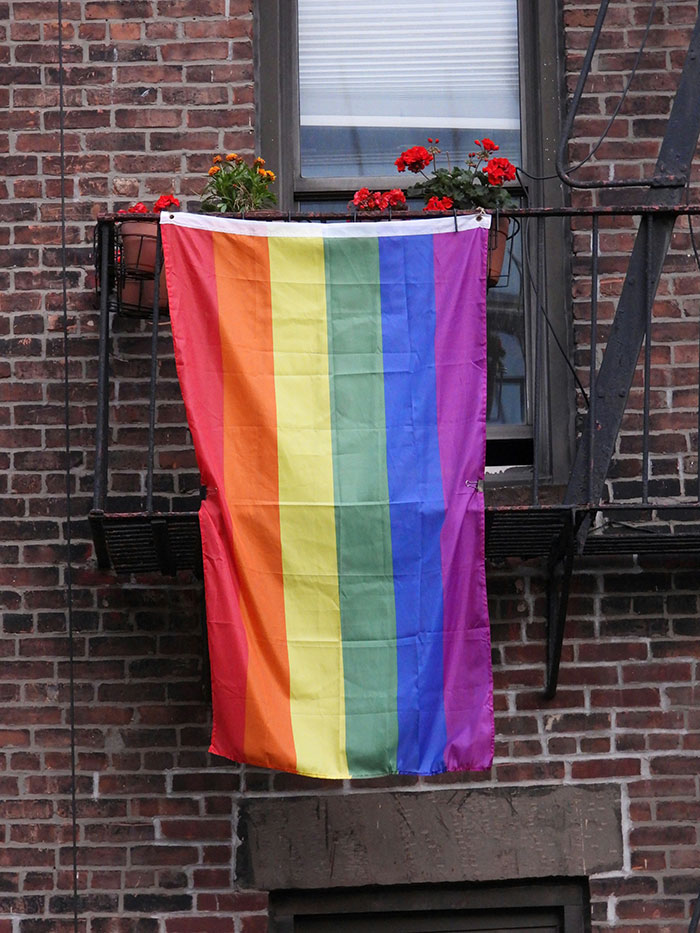A Florida man was taken into custody after throwing an angry tantrum at a Starbucks when he saw a Pride flag displayed on the wall.
Police say 31-year-old Tucker Alden Kemp, of Clearwater, entered the Starbucks located on the 900 block of 4th Street in St. Petersburg on the morning of October 22, where he became offended by the rainbow flag and demanded to speak to the manager.
When the conversation didn’t go his way, things quickly escalated, with Kemp “taking matters into his own hands” and destroying the flag, as per police.
A Florida man was arrested after throwing a Pride flag in the trash at a Starbucks, demanding it to be replaced with an American flag

Image credits: Tucker Kemp/LinkedIn
According to the arrest affidavit, Kemp doubled down on his stance, insisting that the Pride flag was “offensive” and telling the store manager that it should be replaced with an American flag instead.
The manager, maintaining composure, explained that the display wasn’t a personal decision but a matter of company policy.

Image credits: AK/Unsplash (Not the actual photo)
When his demand was refused, the 31-year-old reportedly grew agitated. He picked up his drink, raised it toward the wall, and splashed the contents across the rainbow flag, soaking it in tea.
Kemp allegedly yanked the flag down with enough force to damage the plaster underneath. Then, in one final act of defiance, he stuffed the drenched symbol into a nearby trash can.

Image credits: Pinellas County Arrests and Mugshots
Police later confirmed the damage amounted to $210, including both the ruined flag and the wall it had been affixed to.
“Kemp was offended by the Pride flag hanging on the wall of Starbucks and told the manager that the store should put up an American flag,” officers summarized in their report.
Kemp was arrested shortly after his outburst and charged with a first-degree misdemeanor



Image credits: toktotucker
Police arrived shortly after the disturbance and arrested Kemp for criminal mischief, a first-degree misdemeanor in the state of Florida. He was booked into the Pinellas County Jail, where records show he spent about six hours before being released on $500 bond.
According to news outlets, Kemp is a registered Republican, married with one daughter, and works as a sales manager for Dignity Memorial, a Tampa Bay funeral home chain.



Image credits: Damiano Baschiera/Unsplash (Not the actual photo)
The outlets also reported that the incident occurred just after 9:16 am, when customers were seated inside the café, some of whom witnessed the confrontation unfold.
While Kemp has not made any public statement since his arrest, the affidavit indicates that his frustration stemmed from his belief that displaying a Pride flag in a corporate setting was inappropriate.
While the US protects the right to freedom of speech, those protections end when it comes to the destruction of someone else’s property



Image credits: Getty Images/Unsplash (Not the actual photo)
Under Florida law, what Kemp did is considered criminal mischief.
The state defines the misdemeanor as the willful and malicious destruction of property belonging to another person or entity. This includes acts like graffiti and vandalism.



Image credits: toktotucker
Penalties under Florida’s criminal mischief law are proportional to the amount of damage caused. If the damage is $200 or less, the offense is a misdemeanor of the second degree.
If the damage is greater than $200 but less than $1,000, it becomes a misdemeanor of the first degree. For damages of $1,000 or more, the charge escalates to a felony of the third degree.
Because the damage caused by Kemp was estimated at $210, he was charged with criminal mischief as a misdemeanor of the first degree.



Image credits: Pinellas County Arrests and Mugshots
While the First Amendment protects the right to express disagreement, those protections end when speech turns into destruction of property.
Under US constitutional law, the First Amendment safeguards verbal expression, peaceful protest, and even symbolic acts but only when those acts do not infringe on the rights of others or violate established laws.

Image credits: Sand Crain/Unsplash (Not the actual photo)
Once an expression involves willful damage to another person’s property, it ceases to be protected speech and becomes criminal conduct that the state has a legitimate interest in punishing.
Courts have long drawn a line between expression and action.
The Supreme Court has upheld that symbolic acts, such as burning one’s own flag in protest, fall under free expression. However, the same protection does not extend when the property involved belongs to someone else or when the act causes measurable damage.
“Spilling the tea.” Netizens took to social media to share their thoughts on the incident















from Bored Panda https://ift.tt/NyZbX9Y
via IFTTT source site : boredpanda